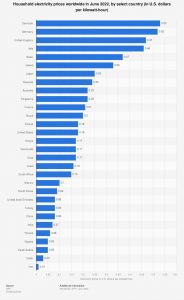Monday/Tuesday blog
Where coal is king
I’ve been trying to write an article for a South Korean newspaper to help promote the Korean version of my climate book:
I think around 1,000 copies were published there and about 700 copies have been sold. So the issue is to shift the last 300 copies.
South Korea has some of the lowest household energy prices in the world:
(left-click on image, then left-click again to see more clearly)
At 9 US cents per kilowatt-hour (KWh), South Korea is only slightly more expensive than India (7 cents/KWh), China (8 cents/KWh) and much cheaper than the USA (18 cents/KWh), Singapore (22 cents/KWh), Britain (47 cents/KWh) and Germany (52 cents/KWh).
What I was trying to do was establish if there was a link between a country’s energy costs and the source of that energy – coal, oil, gas nuclear, wind, solar etc. The first thing that leapt out from the figures was that in general (there are some exceptions such as Germany) the more coal a country used for its energy, the cheaper that energy was. For example:
- India energy cost 7 cents/KWh, 57% of energy from coal
- China energy cost 8 cents/KWh, 55% of energy from coal
- South Korea energy cost 9 cents/KWh, 24% of energy from coal
- USA energy cost 18 cents/KWh, 11% of energy from coal
- Britain energy cost 47 cents/KWh, 3% of energy from coal
- Germany energy cost 52 cents/KWh, 17% of energy from coal
There many other analyses one could do. For example, you could compare how much nuclear energy a country uses with its energy cost. France with energy costs of 21 cents/KWh gets 36% of its power from nuclear, whereas neighbours Britain (47 cents/KWh) only has 6% nuclear and Germany (52 cents/KWh) is at just 5% from nuclear and is closing down the last of its nuclear power stations in the next few years. But I don’t have the space to do these analyses in a short blog.
The renewables farce
Another issue the figures suggested was that the more renewables – solar and wind – a country used, the higher its energy costs in spite of our lying politicians claiming that renewables such as solar and wind will give us a cheap energy future:
- India energy cost 7 cents/KWh, 3% of energy from solar and wind
- China energy cost 8 cents/KWh, 6% of energy from solar and wind
- South Korea energy cost 9 cents/KWh, 2% of energy from solar and wind
- USA energy cost 18 cents/KWh, 6% from solar and wind
- Britain energy cost 47 cents/KWh, 10% of energy from solar and wind
- Germany energy cost 52 cents/KWh, 13% from solar and wind
Just fantasy figures?
But the situation with supposed clean energy such as solar and wind may be much worse than the above figures suggest. Why? Because we’re not actually paying the full cost of unreliable, intermittent and expensive solar and wind. Instead our rulers are hiding the full cost from us by giving massive subsidies from general taxation to solar and wind projects. For example, in the 5 years from 2016 to 2021, the British government was reported as paying �8.7 billion in subsidies to renewable energy companies. That’s �1.74 billion a year – a cost that should have appeared on our electricity bills were there no subsidies from general taxation.
Moreover, the costs for ‘green energy’ don’t include the cost of keeping gas, oil or even coal plants available to be fired up on days when there is no sun or too little or too much wind.
The United States approved a�$430 billion�new green energy subsidy package in the summer labelled the Inflation Reduction Act (IRA), offering tax breaks for components used in renewable energy technologies on condition they are made in North America.
We even see a similar situation in South Korea where�the government has now announced its Green New Deal, which includes KRW 8 trillion for green projects. This will also help hide the true cost of supposedly ‘green energy’.
The two energy worlds
Looking at the figures, there appear to be two quite distinct energy worlds. There’s the real world in which countries which burn a lot of coal and use very little wind and solar have eye-wateringly low energy prices of just a few cents/KWh and staggering growth rates as industry and jobs naturally gravitate towards countries with low energy costs. Then there’s the energy fantasy land where massive taxpayer subsidies and hiding the true costs allow lying/stupid (delete as appropriate) politicians to claim that the transition from fossil fuels to supposed ‘clean energy’ like wind and solar will give their countries cheap, reliable energy security.
As for Keir ‘Just Stop Oil’ Starmer’s boast that he’s going to make Britain a ‘clean energy superpower’ – the figures from many countries show this is complete nonsense. All he’s going to do is crush the UK economy and bankrupt Britain.
My ignorant opinion is that if the useless Tories were to dump ‘Net Zero’ and admit that the whole man-made climate cult is a load of nonsense, they’d win the next election. But hey, what do I know?
















You know (or acknowledge) the reality of the situation, unlike almost every western politician (who hope to get on on the gravy train)
Ian is right – it is a green gravy train at taxpayers expense. Farage and Rees-Mogg both believe we have to reach net zero but more slowly. Hence they appear to believe that human release of carbon dioxide is a problem but they never discuss this aspect. It isn’t surprising that they don’t want you on GB News telling us that there is no climate crisis. The reason is probably because their income from adverting could decline and presenters also enjoy their investment incomes. It could be the same with most media where the owners determine the narrative. Thank goodness for the unbiased, factchecked BBC.
David Starkey gets to the truth when he says the government isn’t in control and in addition they haven’t a clue what to do anyway. Ofgem which claims to be independent is funded by the companies it regulates and they are making loads of money from it, especially from renewable generation. Ofgem states that it is protecting us by delivering a cleaner, greener environment and specifically one of its objectives is to deliver a net zero economy. It talks about doing it at the lowest cost but gives no indication about what that will be. The health regulators are also funded by the businesses they regulate and investors like Bill Gates, and so they generated a pandemic to sell vaccines with the help of polticians who also made it much worse with lockdowns. What should concern us is that most of the west does the same.
I suspect if politicians adopt your suggestion and say there is no climate crisis and they have been lying to us for years there will be a mass panic and more fear that we are running out of time to save humanity and the earth.
I would like to see more discussion of our past. If we had not discovered coal deposits and steam power around the same time, we would have still be cutting down trees for heating and ship building. There would not be a tree left. Fossil fuels saved the environment.
I’m surprised that you say France only produced 36% of its energy from nuclear. I thought it was nearer to 70%, or does your data include all energy and not just electricity?
Could the reason that Germany, the erstwhile European power house, is now in recession, be that after Fukushima they panicked, closed down nuclear power, sprouted temperamental wind-dependant turbines like gigantic malignant Triffids, then decided for “reliable” power generation to import gas from Russia? That worked out well, didn’t it? And they can’t say they weren’t warned. Trump told them unambiguously they were putting themselves at risk. This idiotic obsession with net zero, to which almost all leaders of the West appear currently to subscribe, can only end in disaster and the destruction of existence as even the oldest readers of this blog have known it almost all our lives. I accepted the “deprivation” (as it would now be called) of my earliest years, attributable to WW2, but it didn’t bother me since it was all I knew. Those years have, though, caused me greatly to value all that has come in the succeeding 75 years – meat, butter, eggs, cheese, chocolate, oranges, bananas on supermarket shelves, all of whose acquisition requires “only” money, not “points” in ration books, central heating in winter, hot water at the turn of a tap, my own car on the drive of the house I strived most of my working life to own, waiting at the turn of its key to take me anywhere I wish to go. Fact is that all these net zero fanatics currently take all the above for granted. They appear incapable of relating the realisation of their “no oil”, carbon-consumption-free fantasy to the practicalities of modern life or to the comfort and convenience they have always taken and continue to take for granted. I await with some interest their reactions next winter when we experience the first UK “load shedding” since the early 1950s. Do they even know what it means? Hours in the cold and dark in the depths of winter? Regarding Nigel Farage, watching and listening to him with David Starkey on GBNews yesterday evening, I’ve a suspicion he regards “anthropogenic climate change catastrophe” theory with as much scepticism as do millions of other UK citizens, but dare not openly say so for fear of being engineered off the channel in the same way as was Mark Steyn. Starkey on the other hand makes no bones about his opinions! Good for him! A man with a spine. I guess he reckons that having been cancelled once already he has nothing to lose and, therefore, nothing to fear from speaking out. (It was a pity that time constraints, ad breaks etc., prevented him saying all he evidently wanted to say.)
In relation to what Stillreading says about last night�s GBNews, I agree that Farage seemed to indicate that he does not accept the science, but you had to pay close attention to Rees-Mogg�s slight nod of the head confirming he agrees that we are changing the climate. So he holds two contradictory views. The only reason he objects to net zero is probably because he wants to keep driving his classic Bentley.
I agree Thorpe. I’m not at all sure about Rees-Mogg’s true opinions on “climate change”. He seems tacitly to go along with the anthropogenic theory. I doubt he needs to concern himself about any of it on a personal level though. Except, of course, that when the heat and light go off he, along with all the other politicians currently sitting on the fence, and all the virtue-signalling ignorami, will presumably suffer the same as the reast of us. (Unless they are all stock-piling diesel for those 240 v. generators lurking in the garden shed!)